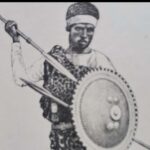MATIWANE
- 3 Min Read
During the early 1800s Matiwane (d. 1829) was chief of the Ngwaneni, “The Nomads of Wrath,” who lived in the foothills of the Drakensberg Range in Zululand. Matiwane built his northern Nguni people into a strong military force.
At this time in the region, the pressures of a variety of people seeking land were intense. To the south were the Boers, to the west the Drakensberg Mountains, inland were the Sotho, and to the north were the Tango people and the broad swampy reaches of the Pongola River.
The Ngwaneni lived to the west of the fearsome Mterwa whose chief was Dingiswayo. In collusion with Zulu chief Shaka, Dingiswayo attacked Matiwane. But Matiwane had learned of the conspiracy and had hidden his cattle with Mtimkulu and the amaHlubi. After the attack, Matiwane went to retrieve his cattle but Mtimkulu refused to return them. Suddenly Zwide of the emaNdwandwe, who lived across the Black Umfolozi River, attacked Matiwane and chased him from his lands.
Matiwane turned on the amaHlubi to regain his cattle and in doing so he massacred all major Hlubi kraals. The Hlubi fled to the west through the passes of the Drakensberg where they descended on the Sutu. The displacement of the Hlubi and their encroachment on the Sutu set off a chain of events known as the Mfecane that had a profound impact on the peoples of South Africa. Although there is no written record, by the mid 1830s an estimated two and a half million people had been displaced. When the Boers came through the area in 1836, they reported finding more skeletons than people.
The emaNgwaneni settled in the foothills for a few peaceful years. But the storm was building. By 1822 Shaka had consolidated a large number of chiefdoms into a highly centralised, militaristic kingdom. The Zulus now routed Matiwane and chased him west, along the same path the Hlubi took, through the Sutu clans. Matiwane destroyed the amaHlubi in 1825, scattering them forever. By absorbing and incorporating the diverse refugees, for a few years, he was the most powerful ruler between the Vaal and Orange Rivers.
With the Zulus at his heels again in 1827, he veered off to the southeast and crossed the Orange River to settle in Thembu country, across the southern edge of the Drakensberg range. Meanwhile, Shaka’s impis had ranged south to the Great Kei River, close to the area the British had settled as British Kaffraria. The British mistook Matiwane’s people for the cattle-raiding Zulu impis and sent out an expedition under Colonel Somerset. The expedition crossed the Umtata River and, using firearms, badly defeated Matiwane. (This was the first time Matiwane had seen firearms.) Somerset withdrew thinking that he had defeated the Zulu.
Matiwane’s spirit was broken. His people scattered. He headed north and was taken captive by Dingane, Shaka’s successor. Dingane gouged out his eyes and killed him by driving wooden pegs up his nostrils.
VIRGINIA CURTIN KNIGHT




